Top Stories World Cup Brazil 1950
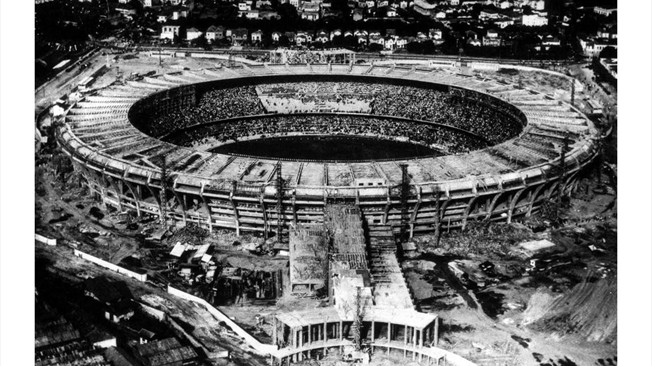
Last update 6 April, 2024 por Alberto Llopis
At the FIFA Congress 1938, celebrated in June, it was decided to postpone the election of the host country of the Fourth World Cup, due to the growing international political tension, he advised not to consider the nominations submitted by Germany, Argentina and Brazil to celebrate editing 1942. It was until July 1, 1946 that FIFA was able to hold its first post-war Congress. The only candidate to celebrate the World Cup, was Brazil, so the seat was granted without further discussion. It was then agreed to call the tournament “Jules Rimet Cup”, in honor of the French leader's efforts to create the sporting event and then to keep it alive during the difficult years of the war.
The Italian Barassi secretly removed the World Cup from the safe of the Roman bank where it was deposited from 1938 and protected her in a shoe box under her bed, to prevent the Nazis from taking over her, when the war was about to end and Germany had taken control of Italy. A success for FIFA was that in 1946 the return of the four British federations to FIFA had occurred, Inglaterra, Escocia, Northern Ireland and Wales, which implied, now yes, a World Cup in every sense of the word.
En 1948 The London Olympics were held, which were the first sports demonstration after the war. The test was passed successfully: the wounds left by the conflict were still open, but the countries showed the desire to recover peace in all aspects. The teams that took the podium in London were Sweden, Yugoslavia and Denmark. The first two, Sweden and Yugoslavia, their respective groups won and qualified for the World Cup. It is noteworthy that Yugoslavia left France out, who together with Brazil had been in the previous three World Cups. They had no problems rating Switzerland and Spain, by Europe, so together with Italy, campeón vigente, and England, made up the group of six European nations in Brazil.

For South America, were scored directly without playing any matches, Bolivia and Chile of the group 7 before the retirement of Argentina, who gave up participating due to the great differences that existed between the AFA and the CBD, in addition to the strike that had affected local soccer in 1948. The absence of the "albiceleste", prevented the young Alfredo Di Stéfano, de 24 años, could play his first World Cup and was also deprived of attending the fantastic River Plate forward known as “the machine”. In the group 8, the same without playing, Paraguay and Uruguay rated before the withdrawal of Ecuador and Peru, with what they would be 5 South American teams, including the local Brazil.
From the North and Central America area, Mexico and United States rated, they left out in the group 9 To Cuba. Desafortunadamente, of the expected total of 16 equipment, there were three more defections: Escocia, who had qualified, made it known that he would not go to Brazil if he did not win the British national team championship, and how he lost it, resigned from the World Cup. The group qualified 2, that would go between Austria and Turkey, it was declared desert, by resigning both countries and Belgium, del grupo 4, he also gave up, bringing the final number of teams to 13, exactly like in Uruguay 1930.
In addition to those defections that would decrease the group of teams to participate in Brazil, a tragedy occurred a year before its beginning, not only would it weaken one of the favorites, the double world champion Italy, but it would mourn the world of soccer: el 4 de mayo de 1949, the plane in which the Torino team was traveling, back from Lisbon where he had played a friendly match, crashed into the back wall of the Superga basilica, on the outskirts of Turin. In the accident they died 31 personas,
incluyendo 18 campus players, the coaches and two managers.
To give a deserved reception to your guests, the organizers set out to build a great stage, able to house, along with more than 155,000 viewers according to the original project, all the passion and joy of the Brazilian people. This is how the “Maracaná” stadium was born, whose official name is “Journalist Mário Rodrigues Filho”, in honor of the journalist who managed to convince the authorities that the best place to build the stadium was on the grounds of the old Derby Club, in the Maracanã neighborhood in Rio de Janeiro. Despite having come into use in 1950 (opened on 16 de junio, with a friendly between the teams of Rio and Sao Paulo), the works were not completed until 1965.
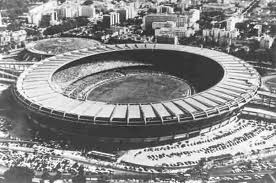
To conduct the competition, the organizers decided to change the “cup” competition system and take it to a group format in its preliminary phase. In this there was a financial reason, since more games would be played and would consequently generate more income and a logical reason: there was no point in traveling the European teams across the Atlantic to play a single game and be eliminated.
The Bicampeona Italia was reduced in the World Cup 1950. The "azurra team", deprived of their 8 o 9 usual headlines that were part of Torino, it had been further weakened by having chosen the sea as the route to reach Brazil. The fears born from the tragedy of a year before, caused the Italians to embark on a journey of 15 days instead of taking air travel that took hours.
The news that shocked the world, arrived from Belo Horizonte: the proud English were defeated 1-0 for the United States, a curious team made up of an Italian goalkeeper, Villages, a Belgian defender, Pussy, two Portuguese brothers in the attack with the surname Souza and a Haitian, Joe Gaetjens. With a messy football, but lively and with a huge dose of fortune, the Americans surprised the English. British newspapers reported the dishonorable defeat to a team of amateurs, there was even one who understood the cable arrived from Brazil as an error, interpreting that the marker had been 10-1 in favor of england. The scorer of the goal, posteriorly, hired by Racing de Paris, went on to say that in 1950 did not have American citizenship.
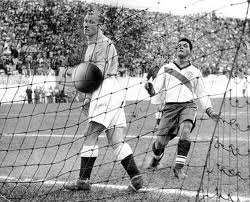
"Maracana", recorded the best entry in the tournament in a game in which Brazil did not intervene. Spain and England, they clashed to define the group, with an advantage for the Spanish, they came with 4 points for 2 of the english. Goalkeeper Ramallets completed a historic performance, stopping with great spectacularity the high balls, what earned him the adjective, by the international press of "Maracaná cat". Zarra scored the winning goal and the English had to return home with shame in tow: his first world, the one who surely thought to win without problems, it was settled with a victory and two defeats and just two goals scored.
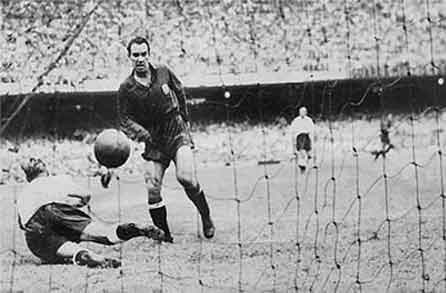
Brazil and Uruguay played the final. En Río de Janeiro, as in all Brazil, security was absolute: being enough a tie to be champion, no one doubted that the powerful local team, that he had ripped his two previous rivals apart in the final group and that
had scored in total 21 goals in the 5 World Cup matches played, would have no problem beating Uruguay, who had arrived at that instance with very tight results.
The whole country was getting ready for the big party: they had prepared 11 limousines that had on the sides the names of each of the players, from Barbosa to Chico. A parade had been organized through the streets of Rio, practically a carnival, Everywhere there were signs saying "Tribute to the world champions". The Brazilian newspapers took the victory for granted and the biggest doubt was the number of goals Brazil would score..
The euphoria was so much, that the Uruguayan leaders themselves felt that there was no hope of obtaining a good result, to the degree that, in a meeting before the game, stated that they would consider themselves satisfied if they obtained an "honorable loss" by no more than a couple of goals difference. But in the group, DT “Juancito” López and Captain Obdulio Varela, they didn't think like that. The "black boss" motivated his teammates, making them feel that the match was nothing more than a game against 11 men just like them. Varela summed up his harangue with a phrase: "Boys, today I really want to run ".
The result is known to all. Uruguay won by 1-2 in the celebrity “Maracanazo”. Among the many stories woven around the hours following this game, there are fights in the streets of Brazilian cities, fans who still the next day continued in the stands of "Maracaná", crying defeat and of course, there is talk of various suicides. Thanks to the goal of Alcides Gighia, the Uruguayans were the fair winners of the tournament 1950.
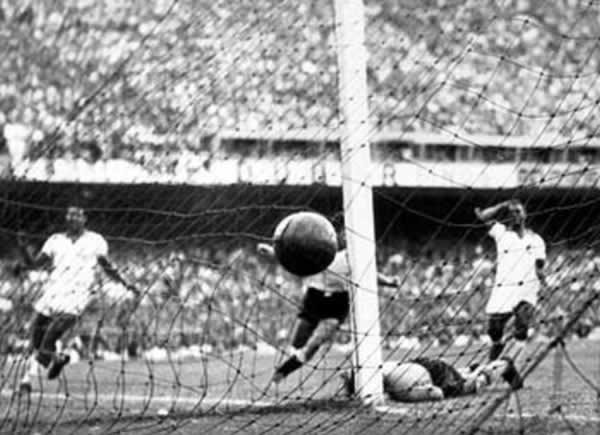
Inside the stadium, there was a person who was neither Uruguayan nor Brazilian, but he was equally shocked by the result: the President of FIFA, Jules Rimet. His speech to deliver the trophy and congratulate the expected champion, Brasil, written in portuguese, it was kept in his pocket. In the confusion that followed at the end of the game, it is said that the cup, guarded by CBD (Brazilian Sports Confederation), He disappeared. The legend goes on to say that realizing that, Obdulio Varela screamed: "With or without cup, the champions are us ”.
Finally, the valuable gold "victory", was delivered. Definitely to deliver the trophy to the Uruguayan captain, was not in Jules Rimet's plans. Amid the almost absolute silence of the semi-empty stadium, without speech and with a face that makes it clear that he had not yet assimilated what happened, the old leader put the Cup in the hands of Obdulio Varela. One of the greatest feats and surprises recorded in the history of world football, the so-called “maracanazo”, was consummated with that simple act: Uruguay World Champion 1950.
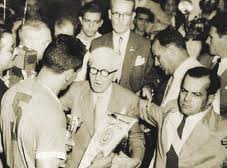
If you want to read the full version, with all its photos and details you can do it here: BRAZIL 1950 1 de 2

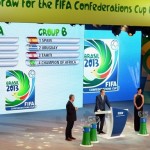
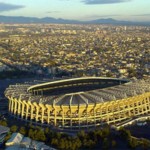
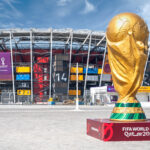

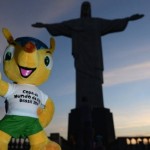

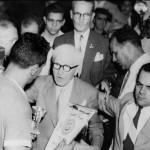
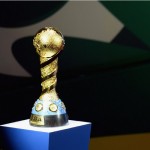

all good